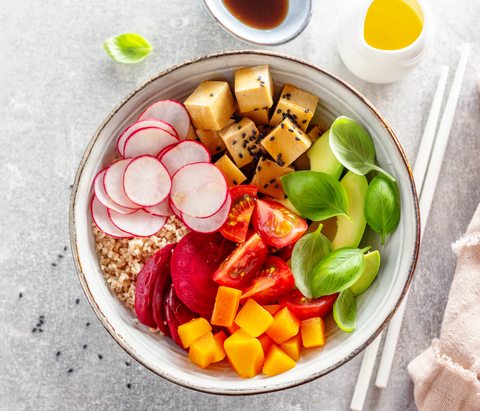The new year is finally here, the time known for new beginnings, fresh starts and fulfilling new resolutions. What better time to try out the vegan diet than during Veganuary? Whether you’re already keto wanting to try out veganism or a vegan trying out keto, combining keto and veganism is a great combo you could try out this January. Even if you’re a complete diet newbie, why not kill two birds with one stone and hit reset on your body to kickstart your 2022?
In this article, we’ll explain the basics of the vegan diet, how the vegan diet specifically combines well with keto, and all the foods we recommend on this double diet!
What is Veganism?
Veganism is a lifestyle that excludes use of animal produce. Some vegans avoid wearing leather clothing or shoes, and only purchase cruelty-free products - though we’ll only be focusing on the diet itself!
The vegan diet is a part of this lifestyle, which involves abstaining from consuming any animal products, including dairy and eggs. A vegan diet involves sticking to plant-based foods, including fruits, vegetables, and grains.
What is the Vegan Keto Diet?
The ketogenic diet is simply a high-fat, low-carb diet. Carb intake tends to be around 25 net carbs per day in order to reach and maintain ketosis - the metabolic process which enables your body to switch from burning glucose for energy to burning fat instead.
Some may believe that keto is not compatible with veganism because of the amount of vegetables and fruits that are high in carbs. However, there are plenty of vegetables and fruits that are not high in carbs, and would be perfect to eat throughout a keto veganuary.
Vegans can definitely reach ketosis by sticking to the high-fat, low-carb ratio with plant-based products, such as seeds, nuts, avocados and coconut oil.
Variations are Welcome!
We know going both vegan and keto is intimidating, but it’s not as black and white as sticking to the diets 100% or not at all! If you’re worried about your ability to go full vegan, you can take it at your own pace, and choose not to eat meat for as little as one day per week. You’ll still feel accomplished and taking small steps is better than giving up entirely!
Maybe you think keto is too difficult for you, which is perfectly okay! Going low-carb is easier than keto, as the low-carb diet allows a higher carb intake. So try going low-carb for a couple days per week and see how you feel! You can mix and match the vegan and keto diet to your convenience - combine full-time vegan with a couple days of the low-carb diet, vice versa.
Benefits of the Vegan Keto Diet Combo
There is limited research surrounding the vegan keto diet. This means that we’re left to put two and two together - the health benefits of keto and that of veganism. Luckily, both the keto and vegan diets have proven to have various health benefits.
Read all about the keto diet’s health benefits here!
Lowering Cholesterol
Little research has been conducted on the vegan keto diet to find well supported health benefits. However, one study placed overweight participants on a plant-based low-carb diet, and found they lost an average of 8-9 pounds and found an improvement in LDL and total cholesterol levels.
Weight Loss
Studies show that vegans weigh less and lose weight easier than people that regularly eat animal products. A review discovered that over 18 weeks, those that stuck to vegan diets lost around 5.5 pounds more than participants that were regularly consuming meat.
Lowering Risk of Chronic Health Conditions
Studies have found that those on vegan diets have a 75% lower risk of developing high blood pressure and up to 78% reduced risk of developing type 2 diabetes!
Risks
Nutrient-deficiency
At the end of the day, combining a keto and vegan diet can lead to removing many foods from your diet. This can lead to your diet lacking vital micronutrients and consequently lacking energy. Vegans tend to lack calcium, vitamin D, B12, iron and omega-3 fatty acids - you can find more about this here. All in all, make sure you are keeping track of your daily vitamin and mineral intake, and even better, seek advice and guidance from a dietitian.
Equally, it is important you are keeping track of your macros, as keeping up with things like protein intake can be more difficult when ridding meat from your diet.
Read all about counting macros on our previous blog post here.
Keto Flu
Starting the keto diet can lead to the keto flu, a period where your body adjusts to the sudden change of going from a high-carb diet to a low-carb diet. This can lead to feeling many flu-like symptoms, such as fatigue, dehydration and weakness.
Be sure to stay hydrated, get rest, engage in light physical activity and eat foods rich in fibre to help ease symptoms. The duration of keto flu varies from person to person, but generally tends to last a week or less. Before you know it, you’ll be back to tip top condition!
Pre-existing Health Conditions
Because of the restrictive nature of this diet, it may be dangerous for those with pre-existing health conditions. The diet combo is not suitable for those with type 1 diabetes, pregnant or breastfeeding women, athletes or those who have or are prone to eating disorders.
Be sure to consult a healthcare professional before trying this diet if you have any health conditions.
Foods
You may be thinking, how on earth are we meant to keep keto-ing and choose foods that are vegan-friendly? Well, you’d be surprised how easy it is, particularly if you know what to avoid and what you can definitely eat, and if you’re willing to get your hands on the ingredients to start cooking meals in your own kitchen.
Here’s a small guide to help you understand what you can and can’t eat!

No-nos
On the vegan diet, all animal products are off the table. This includes:
- Meat & poultry: Chicken, turkey, beef, pork.
- Dairy: Yogurt, butter, milk.
- Eggs: Both egg yolks and whites.
- Seafood: Mussels, fish, shrimp, clams.
- Animal-based ingredients: Whey protein, egg white protein, honey.
A lot of vegan-friendly foods are high in carbs and so should be avoided. Here are examples of these foods:
- Beans and legumes: Black beans, kidney beans, chickpeas.
- Grains and starches: Cereal, rice, pasta, grains, bread, baked foods.
- Sugary drinks: Soda, juice, chocolate milk, sports drinks, smoothies.
- Sweeteners: Agave, maple syrup, brown and white sugar.
- Fruits: All fruits are quite high in carbs, so limit your intake to small portions of some berries - read below for our list!
- Starchy vegetables: Winter squash, peas, potatoes, sweet potatoes.
- Low-fat diet foods: These tend to be high in added sugars!
- High-carb sauces: Marinades, sweetened salad dressings etc.
- High-carb alcoholic drinks: Wine, sweetened cocktails, beers.
- Highly processed foods: Usually too high in carbs, you should limit packaged foods and instead eat whole, unprocessed foods.
Recommended Foods
The main idea is to reduce your carb intake and replace your carbs with healthy, unsaturated fats and protein that is vegan-friendly. Not too difficult, right?
Foods you can eat include:
- Particular beans: Green beans, black soybeans (we love this black soybean pasta).
- Avocados: Whole avocados and guacamole.
- Berries: Blackberries, blueberries, raspberries and strawberries (in moderation).
- Non-starchy veg: Leafy greens (kale, spinach, cabbage, watercress, lettuce etc.), brussel sprouts, broccoli, cauliflower, peppers, mushrooms, zucchini.
- Oils: Olive oil, nut oil, coconut oil, MCT oil, avocado oil.
- Coconut products: Full-fat coconut milk, unsweetened coconut, coconut cream.
- Nuts and seeds: Walnuts, almonds, Brazil nuts, chia seeds, hemp seeds, macadamia nuts and pumpkin seeds.
- Nut and seed butter: Peanut butter, sunflower butter, cashew butter, almond butter.
- Protein: Full-fat tofu, tempeh.
- ‘Dairy’: Coconut yogurt, vegan butter, vegan cream cheese, cashew cheese.
- Condiments: Fresh herbs, lemon juice, all spices, salt, pepper, nutritional yeast.
When purchasing vegan products, just be sure to check carb content, and try your best to opt for non-processed options.
Cheeky Exceptions - Sweet Snacks & Bread!
Snacking on the vegan keto diet seems near impossible after seeing the long list of vegan keto no-nos, and so you may be wondering whether this lifestyle is worth sacrificing your sweet treats and convenient meals.
Luckily for you, we have plenty of options that you can indulge in to help you get through this keto Veganuary!

Our Mug Cake Mixes are vegan and keto-friendly! That includes a Chocolate and Carrot Mug Mix. Our Caramel Mug Mix is unfortunately not vegan, though you can give that away to one of your friends or loved ones, or if you can’t resist save it as a reward after January!

Not too concerned about the specifics of the vegan diet, like egg replacers? Well our Pancake & Waffle Mix is keto-friendly and can be counted as vegan if you’re not too fussed about the odd animal based ingredient. Make your stack sweet or savoury, or get creative and use our mix to make wraps or pizza waffles! Who said trying Veganuary keto-style would be no fun?

Are you a bread lover like ourselves? Well our Multiseed Bread Mix is completely vegan and keto-friendly, making it your ride-or-die this guilt-free Veganuary. This is a fuss-free recipe that only requires water. Now you can indulge in sandwiches, french toast or even burgers!
A smart vegan keto meal idea is using our Bread Mix to make garlic bread, and serving this with some soup!
A Challenge to Kickstart the Year!
The health benefits of both veganism and keto are appealing, and the focus on whole, unprocessed, plant-based foods that are high-fat and low-carb is the perfect way of helping recover your body after the festive season’s overeating slump! So, what better way to hit reset this new year than try a vegan keto diet?
Even if you don’t think this diet is one you can sustain throughout 2022, it’s a rewarding diet to try out for January. Just be sure to stack up on your nutrient supplements and keep track of your net carbs. Let us know what you think, and if you’re already knee-deep, then tell us how it’s going by commenting down below!
As a reminder, we are not medical professionals and be sure to consult your doctor before trying the vegan keto diet - especially if you have any pre-existing health conditions.




Comments (0)
There are no comments for this article. Be the first one to leave a message!